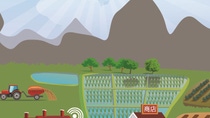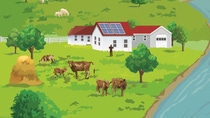The future farm

In future, consumers will expect more transparent food production processes. Rising temperatures create opportunities for new crops, while water stress, rocketing energy and production costs will drive innovative solutions. Future farms demand better soil, more advanced crop protection solutions and higher energy efficiency to provide all people with high-quality foods.

Energy farming
Farmers nationwide are installing wind turbines, hydroelectric generators and solar panels in their fields and turning straw into fertilizers.
To help their production, BASF is developing efficient and effective alternative energy solutions covering wind energy and solar energy.

New sources of protein
With summers becoming hotter and drier, and winters warmer and wetter, farmers are introducing new plants to the market making new sources of protein possible. Does anybody want bug burgers?

Food network
American farmers are selling their products on Twitter. In this inter-connected world, farmers are able to access their customers directly – they answer questions on social media, receive visiting students and launch Caring Farms initiatives right from their properties.
Protecting bugs
With increasing industrial attention to biodiversity, farmers are building more hedges, using natural insecticides, and expanding field boundaries and forests.
Bees and crop protection are equally important to crop yield. BASF, valuing bees as farmers do, is committed to ensuring responsible and proper use of our products.

Healthier livestock
By 2030, the world will consume twice as much meat as in the 1960s. Farmers therefore have to produce more meat while at the same time minimize the environmental impacts of their activities. To address this challenge, they need better methods to feed and breed livestock.
BASF organic acid can be used to preserve raw materials and compound feeds, ensuring the efficiency of livestock feeding.

Golden soil
It takes more than 150 years to form one centimeter of topsoil, however, we are losing topsoil every year due to various reasons, resulting in great losses of farmers. Proper soil structure and nutrition management has a critical role to play in maximizing production and reducing greenhouse gas emissions.
BASF agricultural solutions, which include crop protection, nitrogen management and degradable mulch films, help to save time and costs for farmers, reducing impacts on soil and the environment and increasing output.

Water stewardship
By 2050, water in rivers will increase 10% to 15% in winter, but decrease by 80% in summer. To prevent possible floods and droughts, farmers will have to improve water recycling and invest in collecting systems, advanced irrigation systems and winter-pool.
BASF provides farmers with practical suggestions and tools for protecting water resources, and helps them reduce the impact on water during their production process.

